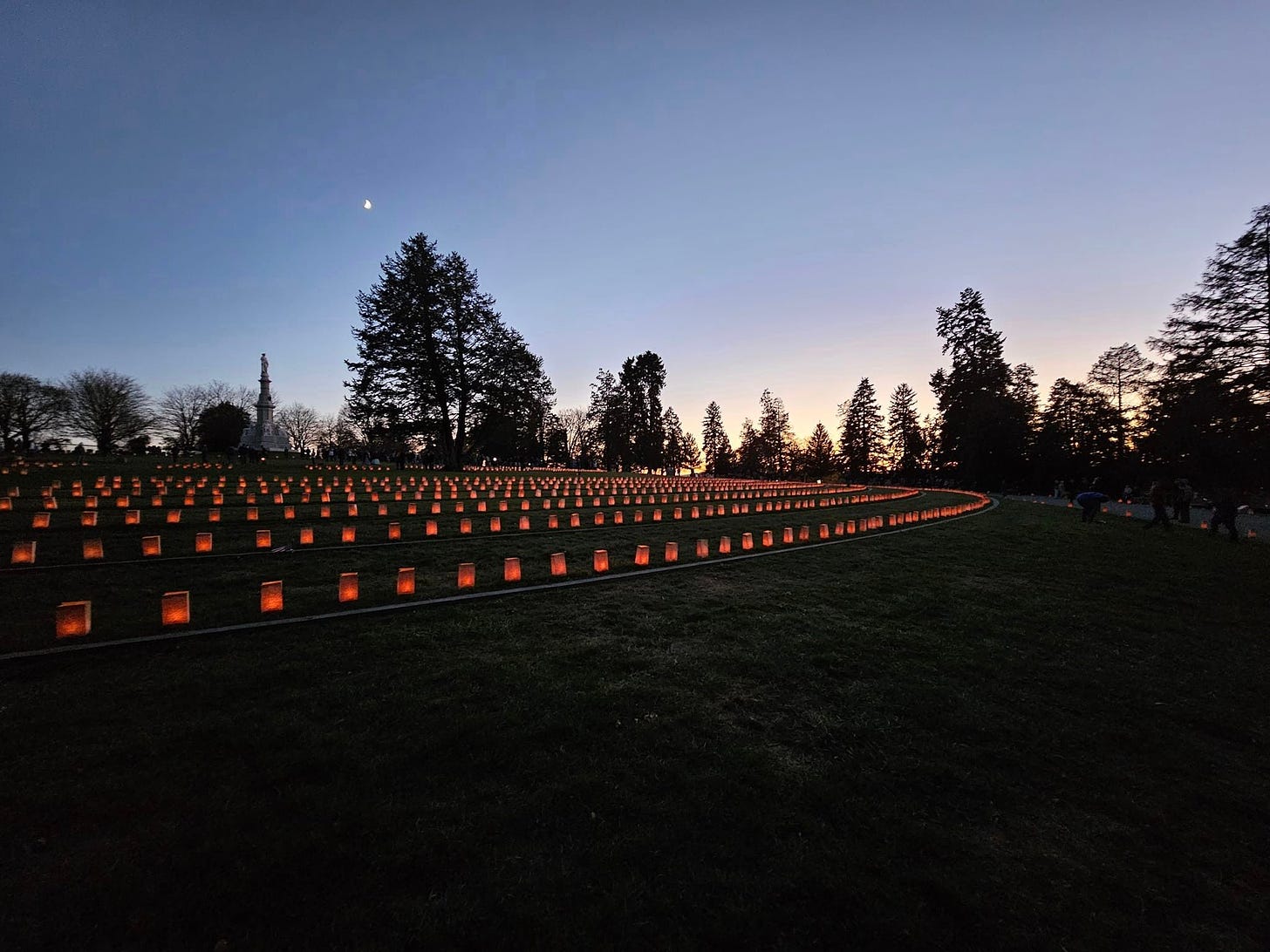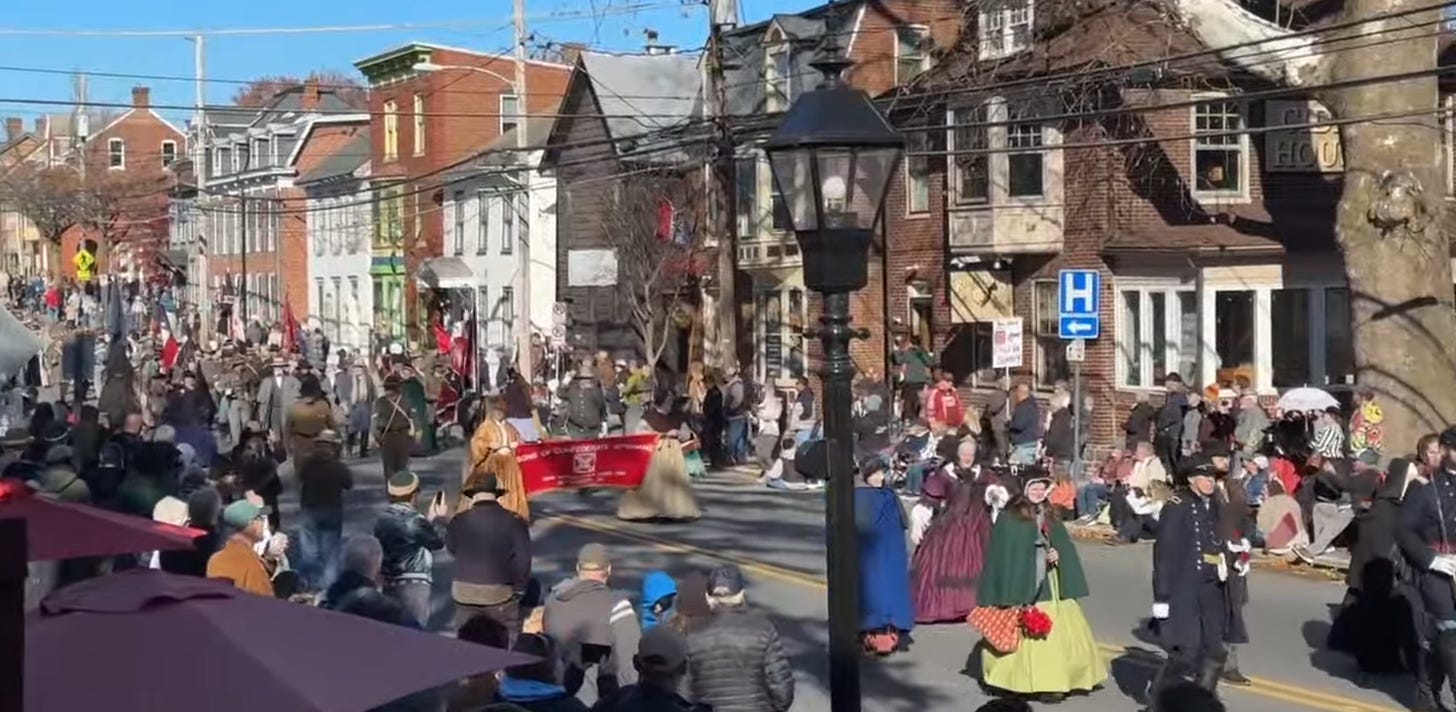This post typically appears on Thursday and is available only to paid subscribers, but I am going to make an exception today given the occasion. Today is the 160th anniversary of President Abraham Lincoln’s “Gettysburg Address.”
[The comments section below is also open to anyone who would like to share their thoughts.]
But before I get to that, a reminder that tonight I will be hosting a discussion about the movie GETTYSBURG for all paid subscribers at 7PM EST. I emailed a zoom link yesterday, but will do so again later today for anyone who has since or would like to upgrade to join us. It’s going to be a lot of fun.
I’ve been to Gettysburg countless times, but I’ve never been there for the town’s commemoration of Lincoln’s famous speech. I would like to do so at some point.
There is the illumination of the soldiers’ graves in the national cemetery, where Lincoln delivered his address.
The National Park Service offers programs specifically around the history of Lincoln’s visit.
The Civil War Institute at Gettysburg College hosts the annual Fortenbraugh Lecture this weekend. In fact, this year you can watch it live on YouTube or at a time of your convenience if you plan on joining the movie discussion this evening.
And then there is the Remembrance Day Parade, which this year took place yesterday. I caught the livestream coverage from the American Battlefield Trust.
I have mixed feelings about it. It’s a great community event, but it always appears to be an event that only brings out the white community. It’s concerning given that this is an anniversary that has been so deeply connected over the years to the history and memory of emancipation and freedom.
I am sure there are many reasons for this, but I can’t help but to think that the presence of Confederate reenactors among the paraders, with their battle flags blowing in the breeze, has something to do with it. Perhaps it sends a certain message to Gettysburg’s and Adams County’s African-American population?
On the one hand, it’s certainly a reminder of the power of reconciliation over our memory of the Civil War, but as David Blight has reminded us, to whatever extent the nation did reconcile, it came at the expense of a memory of emancipation and the service of Black United States soldiers.
In 1863, the Confederate invasion of Pennsylvania forced the Black population in and around Gettysburg to flee their homes and property. Hundreds were kidnapped and brought back into the South by Confederates.
Robert E. Lee’s Army of Northern Virginia functioned as a slave-catching army in the summer of 1863.
To me, the presence of Confederate reenactors in the streets of Gettysburg every year is a reminder of this horror.
Thankfully, not everyone sits idly by an allows these men to parade without reminding the crowd of what they were fighting to maintain.
Over the past few years, Gettysburg College history professor Scott Hancock has followed these reenactors with a sign pointing out the importance of slavery to the Confederate. You can see Scott and his sign just to the left of the blue hospital street sign.
Thank you, Scott.
In the end, this weekend is about a speech that took roughly four minutes to deliver and numbered only 272 words.
Four score and seven years ago our fathers brought forth on this continent, a new nation, conceived in Liberty, and dedicated to the proposition that all men are created equal.
Now we are engaged in a great civil war, testing whether that nation, or any nation so conceived and so dedicated, can long endure. We are met on a great battle-field of that war. We have come to dedicate a portion of that field, as a final resting place for those who here gave their lives that that nation might live. It is altogether fitting and proper that we should do this.
But, in a larger sense, we can not dedicate—we can not consecrate—we can not hallow—this ground. The brave men, living and dead, who struggled here, have consecrated it, far above our poor power to add or detract. The world will little note, nor long remember what we say here, but it can never forget what they did here. It is for us the living, rather, to be dedicated here to the unfinished work which they who fought here have thus far so nobly advanced. It is rather for us to be here dedicated to the great task remaining before us—that from these honored dead we take increased devotion to that cause for which they gave the last full measure of devotion—that we here highly resolve that these dead shall not have died in vain—that this nation, under God, shall have a new birth of freedom—and that government of the people, by the people, for the people, shall not perish from the earth.—Abraham Lincoln
Which brings us to the question for this open thread post. There is no question that Lincoln’s speech is still relevant, but like all iconic speeches, its meaning has evolved over time. Our response to it or interpretation reflects what is going on in the world and in our own individual lives.
Question: Given the events of the past few years, is there a specific phrase or sentence in Lincoln’s speech that resonates with you in a way that deviates from how you previously interpreted it or one that now stands out to your for the first time?
I look forward to reading your responses. The comments section is open to everyone.






Just behind Scott you can see some dude decked out in his standard Virginia Tech colors making sure he stays safe.
that we here highly resolve that these dead shall not have died in vain, that this nation, under God, shall have a new birth of freedom, and that government of the people, by the people, for the people, shall not perish from the earth.
Two related themes : Racial Justice and Democracy (or the lack of) - We cannot have one without the other.
1) We needed a new birth of freedom due to the lack of freedom for enslaved people. We tried reconstruction which had some success but this was reversed by the undemocratic racist agenda of the southern democratic party. At times this involved violent overthrow of biracial Republican state and local government.
2)In recent times we see a similar attempt to overthrow democracy leading to January 6 and followed on ongoing attempts to disenfranchise and ignore democratic results. Some of this is based on white nationalism which is related to the "redeemer" movement to roll back Reconstruction. There is also a world-wide movement in this area.
Lincoln is telling is that we needed to have a second American revolution to complete the ideal presented in the Declaration of Independence since he Constitution did not fulfill this vision. This second revolution is a work in progress with two steps forward and at times steps back. We need to continue the work or we risk losing our democracy.